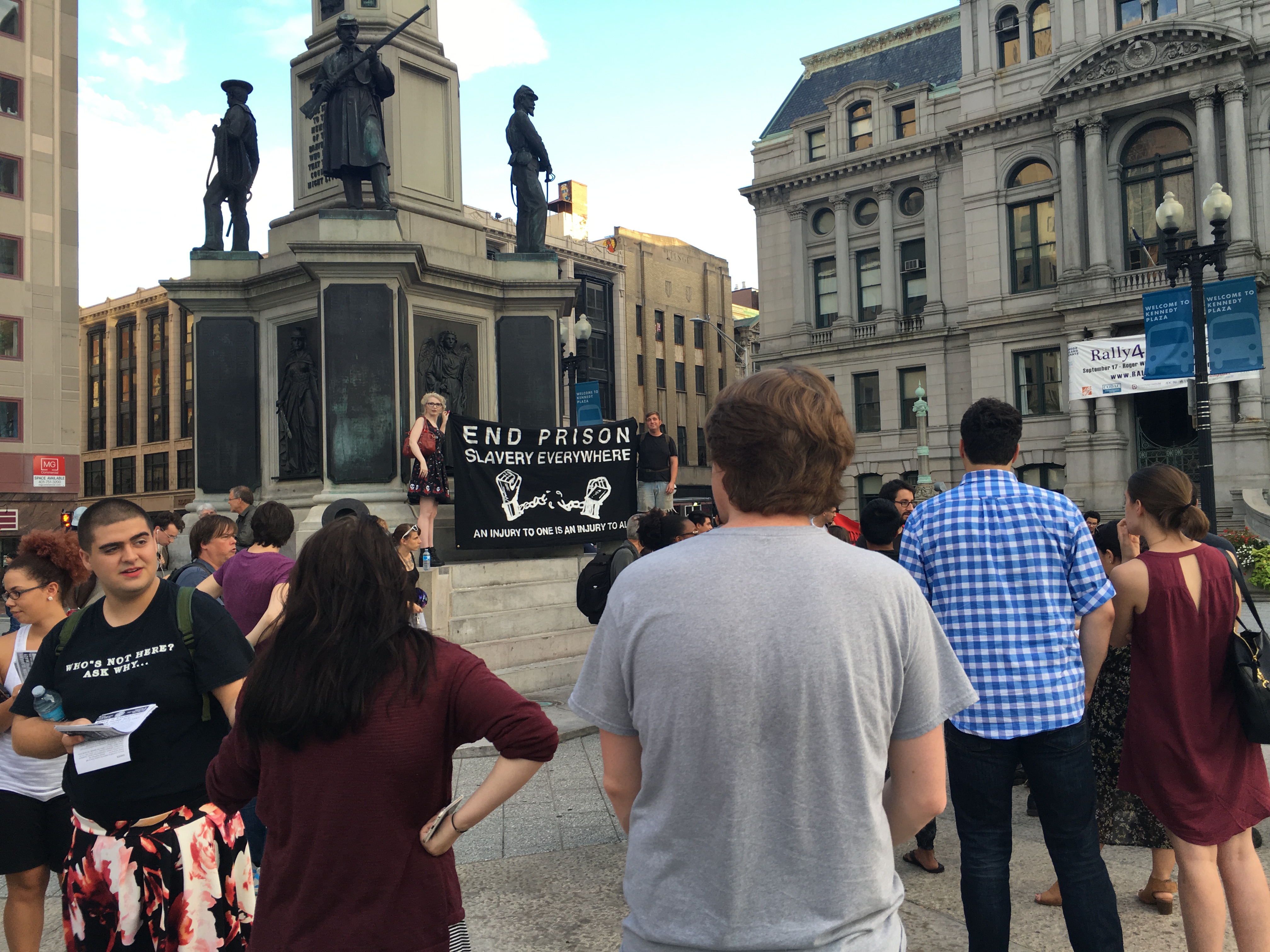Prison strike begins in Providence, nation-wide on anniversary of Attica Uprising
September 9th was the 45th anniversary of the Attica Prison uprising, and the start of the national prisoners’ strike that is currently taking place throughout the United States. On September 9, 1971, nearly two thousand people incarcerated in the maximum security prison in Attica, New York...
 Outside the walls of the prison, organizations and individuals have held actions in support of the prisoners’ demands and strike. There were two such solidarity protests in Rhode Island at the beginning of the month. On September 9th, there was a march from Kennedy plaza through downtown to the Providence Public Safety Complex. About 60 people attended the march. The next day, there was a solidarity rally outside of the Adult Correctional Instution. Servio Gomez, a member of the Providence Chapter of the Incarcerated Workers Organizing Committee, helped organize the Providence events.
“The bulk of the work is initiated and led by people on the inside. Our role on the outside is to move along communications between members who are inside,” says Gomez.
Gomez says his hope is that the strike will not only get the word out, but also help educate the public about the impact of prison society on all aspects of our lives. The Providence Chapter of the Incarcerated Workers Organizing Committee also runs letter writing events the last Saturday of the month at Union Hall to stay connected with those behind bars.
Outside the walls of the prison, organizations and individuals have held actions in support of the prisoners’ demands and strike. There were two such solidarity protests in Rhode Island at the beginning of the month. On September 9th, there was a march from Kennedy plaza through downtown to the Providence Public Safety Complex. About 60 people attended the march. The next day, there was a solidarity rally outside of the Adult Correctional Instution. Servio Gomez, a member of the Providence Chapter of the Incarcerated Workers Organizing Committee, helped organize the Providence events.
“The bulk of the work is initiated and led by people on the inside. Our role on the outside is to move along communications between members who are inside,” says Gomez.
Gomez says his hope is that the strike will not only get the word out, but also help educate the public about the impact of prison society on all aspects of our lives. The Providence Chapter of the Incarcerated Workers Organizing Committee also runs letter writing events the last Saturday of the month at Union Hall to stay connected with those behind bars.
 Letter writing like this has helped spread the word about the strike to people currently incarcerated. Since September 9, prisoners at at least 40 sites in over 24 states have taken action. According to the movement’s website, prisoners did not show up to work at the Holman Prison in Alabama. The site also states that there have been work stoppages and “riots” in multiple correctional facilities in Florida. And that incarcerated people went on strike and released a set of demands in South Carolina, among other states. Due to barriers of communication between those inside and outside of the prison walls, organizers are still learning exactly what is going on inside the walls of the prisons.
No protests have been reported to have happened inside Rhode Island’s Adult Correctional Institution.
“Surprisingly, most prisoners are very hesitant at first to protesting stuff in prison, because they’re so used to being controlled in every aspect of their life that they lose hope, so once prisoners gain that hope, that sense of empowerment, then that’s when the protesting, the agitating starts, ” says Phillip Andrew Ruiz, the West Coast spokesperson for the Incarcerated Workers Organizing Committee.
Ruiz says he was incarcerated for ten years for non-violent drug offense and has been out of prison for 18 months now. He was incarcerated in California, and was moved around to 7 different facilities over the 10 years he served, because of his involvement in political organizing and resistance. Ruiz says one protest he participated in was an impromptu work stoppage at his job in the bread manufacturing industry.
“I was paid, I believe, 9 cents an hour, at the time, and that was one of the superb jobs… It’s kind of like a sweatshop environment… like a factory industrial size…where we bake loaves of bread, and you wrap 4 pieces of bread into plastic and then we repackage it in boxes to get distributed throughout the prison system,” says Ruiz.
Ruiz says he worked from 6am-4:30pm without any breaks or opportunities to eat, which prompted him the work stoppage. Ruiz says resistance is a powerful tool for prisoners.
“Everything that makes the prison function is done by prisoners, and prisoners are awakening to realize that if they withhold their labor, they could… shut down prisons from functioning.”
Prison officials have not said much about the strikes, and have not disclosed much information as to what is occurring on the inside. The strikes and solidarity protests, however, are continuing.
Letter writing like this has helped spread the word about the strike to people currently incarcerated. Since September 9, prisoners at at least 40 sites in over 24 states have taken action. According to the movement’s website, prisoners did not show up to work at the Holman Prison in Alabama. The site also states that there have been work stoppages and “riots” in multiple correctional facilities in Florida. And that incarcerated people went on strike and released a set of demands in South Carolina, among other states. Due to barriers of communication between those inside and outside of the prison walls, organizers are still learning exactly what is going on inside the walls of the prisons.
No protests have been reported to have happened inside Rhode Island’s Adult Correctional Institution.
“Surprisingly, most prisoners are very hesitant at first to protesting stuff in prison, because they’re so used to being controlled in every aspect of their life that they lose hope, so once prisoners gain that hope, that sense of empowerment, then that’s when the protesting, the agitating starts, ” says Phillip Andrew Ruiz, the West Coast spokesperson for the Incarcerated Workers Organizing Committee.
Ruiz says he was incarcerated for ten years for non-violent drug offense and has been out of prison for 18 months now. He was incarcerated in California, and was moved around to 7 different facilities over the 10 years he served, because of his involvement in political organizing and resistance. Ruiz says one protest he participated in was an impromptu work stoppage at his job in the bread manufacturing industry.
“I was paid, I believe, 9 cents an hour, at the time, and that was one of the superb jobs… It’s kind of like a sweatshop environment… like a factory industrial size…where we bake loaves of bread, and you wrap 4 pieces of bread into plastic and then we repackage it in boxes to get distributed throughout the prison system,” says Ruiz.
Ruiz says he worked from 6am-4:30pm without any breaks or opportunities to eat, which prompted him the work stoppage. Ruiz says resistance is a powerful tool for prisoners.
“Everything that makes the prison function is done by prisoners, and prisoners are awakening to realize that if they withhold their labor, they could… shut down prisons from functioning.”
Prison officials have not said much about the strikes, and have not disclosed much information as to what is occurring on the inside. The strikes and solidarity protests, however, are continuing. 
